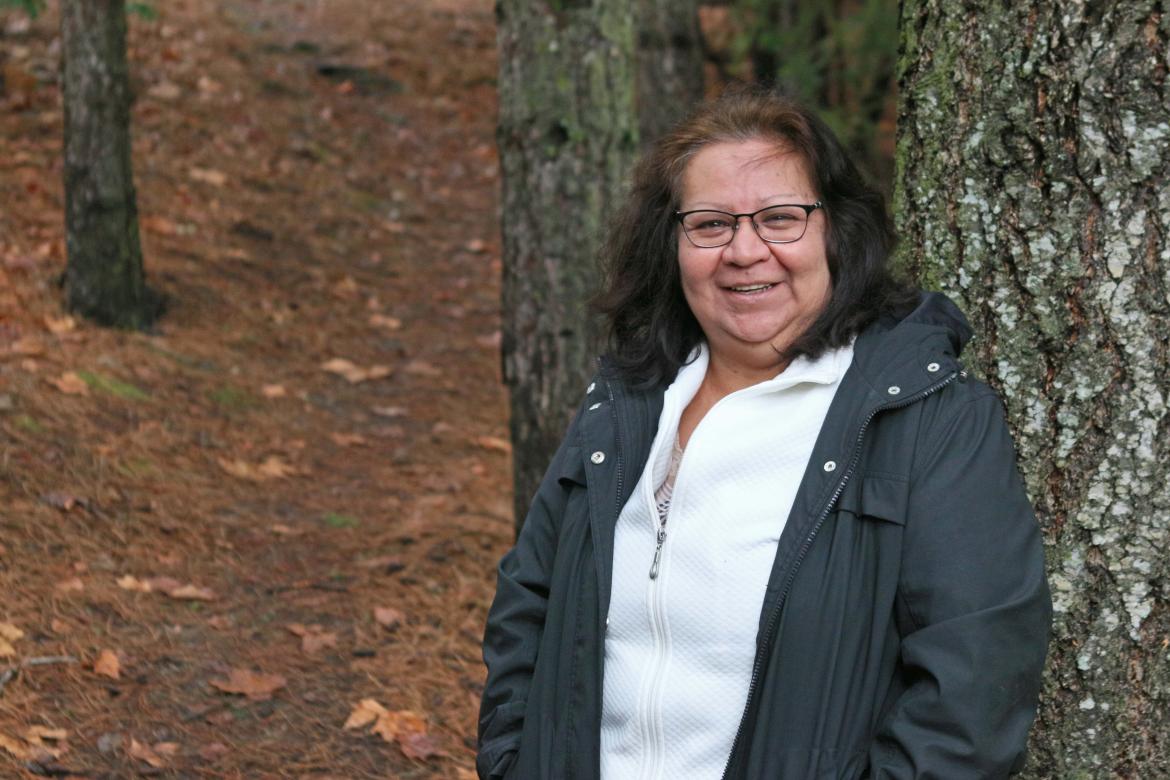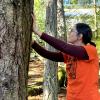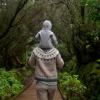
Collette Jones, who joined VIU’s Department of Studies in Women and Gender last fall, is researching how Elders and Indigenous professors teach Coast Salish ways of knowing in the classroom.
April 24, 2018 - 12:45pm
Collette Jones, now part of VIU’s Department of Studies in Women and Gender, happy to be teaching in her own territory
For Snuneymuxw First Nation member Collette Jones, teaching at Vancouver Island University (VIU) represents a homecoming.
Jones, who grew up on her Nation’s reserve in south Nanaimo, started as a sessional instructor in VIU’s Department of Studies in Women and Gender last August after teaching in the University of Victoria’s (UVic’s) Indigenous Education Department for six years.
“Teaching in my own territory means I can include my community in my teachings – it means I am home,” she says.
Jones has always believed that positive change starts with education. After graduating with a Bachelor of Education from UVic, Jones worked as a high school and elementary school teacher for years. After obtaining her Master’s of Educational Leadership at UVic, she became a professor there.
“There’s always this drive with me to do more and an urgency to teach Indigenous content,” she says. “We’ve been invisible in history, education and society, but we are here and we’re not going anywhere. At VIU, this is my chance to inspire Indigenous students and show them that education doesn’t just stop at a bachelor’s degree – they need to go further because they need to take their rightful places in society. We need Indigenous writers, scholars and educators at all levels. There’s so much work that needs to be done.”
For much of her post-secondary teaching career, Jones focused on the history of Indigenous peoples, including her first course at VIU. This semester, she’s teaching a class that celebrates Indigenous women’s resurgence and the resilience of traditional knowledge and culture.
“It’s refreshing, it’s celebratory and I don’t always have to walk away with this heaviness I feel when I delve into the history,” she says. “The guests I invite into the classroom are sharing stories of how they are contributing to the revitalization of Indigenous cultures. It helps build connections and relationships between students and community, which the Truth and Reconciliation Commission has identified as important to reconciliation.”
Dr. Sharon Hobenshield, VIU’s Director of Aboriginal Education and Engagement, says Jones’ personal and professional experiences have much to offer students.
“The fact that she is Snuneymuxw is an additional asset in that she brings understanding of local protocol and traditional knowledge,” she says. “In this era of reconciliation, educational institutions need to make space for Indigenous educators and scholars to support related dialogue and development in this area.”
Jones is currently a PhD candidate in Education Studies: Curriculum & Instruction at UVic. Her graduate research looks into how Elders-in-Residence teach Coast Salish ways of knowing in the classroom.
“The residential school system and the ʾ60s scoop have resulted in a lot of gaps in our cultural knowledge,” she says. “It’s important for me to ensure that knowledge is not lost. I will be interviewing Elders-in-Residence about how they teach Indigenous pedagogy in the classroom, and hope to learn their challenges and successes as an Indigenous educator in the public post-secondary system.”
VIU’s Academic Plan sets out a strong Indigenous focus for the institution, including exploring and promoting Indigenous content, considerations, cultural understanding, perspectives, traditional knowledge and ways of knowing into and across the Institution – a mandate that Jones is excited about.
“There’s so much room for integrating Indigenous knowledge into our learning,” she says.
To learn more, visit Women and Gender Studies.
-30-
MEDIA CONTACT:
Jenn McGarrigle, Communications Officer, Vancouver Island University
P: 250.740.6559 | C: 250.619.6860 | E: Jenn.McGarrigle@viu.ca | T: @VIUNews
Tags: Faculty Success | Indigenous | Women and Gender Studies | Teaching and Learning






